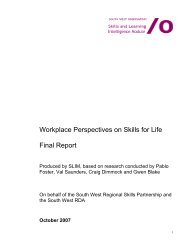Ageless at Work - Skills for Care
Ageless at Work - Skills for Care
Ageless at Work - Skills for Care
You also want an ePaper? Increase the reach of your titles
YUMPU automatically turns print PDFs into web optimized ePapers that Google loves.
<strong>Skills</strong> <strong>for</strong> <strong>Care</strong> London also trailed action learning with over 140 managers across five subregions.<br />
They have developed a Guide (<strong>Skills</strong> <strong>for</strong> <strong>Care</strong> London, 2009) drawing on project<br />
evalu<strong>at</strong>ions, deleg<strong>at</strong>e feedback and the response from London employers, with accompanying<br />
case studies (McDonnell and Zutshi, und<strong>at</strong>ed) th<strong>at</strong> illustr<strong>at</strong>e how the approach has been applied<br />
in the work environment.<br />
Wh<strong>at</strong> works in securing work<strong>for</strong>ce involvement and particip<strong>at</strong>ion?<br />
<strong>Work</strong><strong>for</strong>ce involvement and particip<strong>at</strong>ion is crucial to successful and lasting change in social care.<br />
Table 7 introduces some of the key steps th<strong>at</strong> will ensure individuals in the work<strong>for</strong>ce have the<br />
opportunity to become involved in developing the services.<br />
Spirit and Bell (2009) also identify practical ways in which the work<strong>for</strong>ce can be engaged in the<br />
change process. In particular, they acknowledge the need to: empower, motiv<strong>at</strong>e and recognise<br />
individuals’ contribution to the change process; recognise the emotional and practical needs of people<br />
affected by the changes; ensure th<strong>at</strong> people understand why change is needed, wh<strong>at</strong> the new ‘world<br />
order’ will look like and wh<strong>at</strong> it will mean to them; secure particip<strong>at</strong>ion, understanding and commitment<br />
to change activities; staff training and support; recruit champions from those most positive about the<br />
change; and evalu<strong>at</strong>ion and reflection to ensure the process stays on track.<br />
Research by McNair (2008) reveals th<strong>at</strong> older workers can be critical of managers responsible <strong>for</strong><br />
implementing change, although contrary to popular perception do not find change harder to cope with.<br />
In a survey about older peoples’ experience of change <strong>at</strong> work over the last 10 years, almost three<br />
quarters reported an increase in the use of computers and two-thirds had taken on more<br />
responsibility. However, these older workers did not feel th<strong>at</strong> the pace of change was making life<br />
more difficult, with 83% disagreeing with the st<strong>at</strong>ement “I now find it more difficult to cope with<br />
change”. Where they had experienced change in the workplace they were rel<strong>at</strong>ively positive: 90% said<br />
they understood why changes were being made, and 80% agreed th<strong>at</strong> the changes were necessary.<br />
Three quarters felt th<strong>at</strong> they had been fairly tre<strong>at</strong>ed, and two thirds th<strong>at</strong> their experience had been<br />
valued. However, only half agreed th<strong>at</strong> the change had been well managed.<br />
The Individual Budget pilot evalu<strong>at</strong>ion found th<strong>at</strong> most pilot sites reported difficulties in engaging and<br />
changing practice among care managers and th<strong>at</strong> there was a recognition th<strong>at</strong> front-line staff, in<br />
particular, care co-ordin<strong>at</strong>ors, may consider IBs a thre<strong>at</strong>. The research also found a split in<br />
respondents’ perceptions of the role of social work in IBs between those th<strong>at</strong> thought it provided an<br />
opportunity to ‘rekindle traditional social work skills and others th<strong>at</strong> saw IBs as a further erosion of<br />
social work skills (Individual Budgets Evalu<strong>at</strong>ion Network, 2008). In addition to this perceived<br />
potential thre<strong>at</strong> to professional roles, a pervading cynicism about new initi<strong>at</strong>ives – ‘not more change!’ –<br />
was suggested as a barrier to the success of training.<br />
The Experience M<strong>at</strong>ters programme trailed by Learning South West as part of the South West<br />
Opportunities <strong>for</strong> Older People project provides one example of an approach to comb<strong>at</strong>ing cynicism<br />
among (in this case, older) workers. The project helped older and long tenured Youth <strong>Work</strong>ers to<br />
reflect on their professional practice and, in particular, to promote a gre<strong>at</strong>er understanding of the agerel<strong>at</strong>ed<br />
barriers th<strong>at</strong> prevent workers from contributing to change processes in the workplace. The<br />
22<br />
<strong>Ageless</strong> <strong>at</strong> <strong>Work</strong>: Change workplace cultures, development skills. Good practice report








